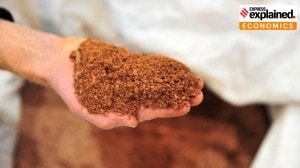Water, water everywhere
Water is a key element in every sphere of life. The earth is composed of three parts of water to one part land. Water makes up 70 percent o...

Water is a key element in every sphere of life. The earth is composed of three parts of water to one part land. Water makes up 70 percent of the total weight of the human body. During Aryan times water was raised with ashmanchakra, consisting of clay pots attached to wheels. And in earlier times the sources of potable water were rivers, wells, springs and rain. Water from sweet water lakes, spring wells or rivers can be rich in minerals. Even in those times it was recommended to filter water that would be used for drinking purposes.
According to Aryan food beliefs, water was never to be sipped from a tumbler or a glass but poured into the mouth from above, since one’s saliva was considered polluting. Water used for rinsing the mouth must be cast out and never swallowed. In many rituals, sprinkling of water has a strong connotation of purification. Buddhists of yesteryears used pure rain water for drinking and cooking. Water meant for drinking had to be clear, cool and health giving. Drinking water was given careful attention. It had to be boiled, exposed to sunlight and then filtered through charcoal. A piece of hot copper was placed in water and at times water was stored in copper vessels. Copper ions, supposedly, had germicidal properties. Lotus flowers were used to scent drinking water. Lotus was frequently grown in tanks to purify and scent the drinking water. Water was also stored and cooled in bark of the areca, then filtered and perfumed.
Ayurveda recognizes water as being heavy. Oil and even heavy logs float on water. It is considered to be soft, flowing and cold. Most of the life giving chemical reactions in our body take place in a water based solution. Water is present in almost all foods, as it is a binding force. Water cleanses our system and provides nourishment. Presence of vital minerals in water helps in the building and repair of tissue. It also serves as a lubricant and a coolant.
Under normal circumstances one should consume at least 750 ml of water for every 1000 calories. A lot of water is lost every day, therefore, it is imperative to replace it continuously. A five percent loss of your body water can cost you 20 to 30 percent efficiency on the job.
Water is equally important in cooking. Though many foods can be cooked in their juices, water is used as a cooking aid for cereals, pulses and other solid foods. Any food that cannot be cooked in its own juice needs extra moisture in form of water. As sources of water differ from place to place, it is but natural for the same dish to have different tastes. In 1992, when I was being interviewed for my present job, I was asked this pertinent question — how important is the quality of water that we use for cooking food. I had not given any serious thought to such a vital query till then.Now I understand as to how maa ki daal cooked in Punjab water tastes so very different in Mumbai.





- 01
- 02
- 03
- 04
- 05


























